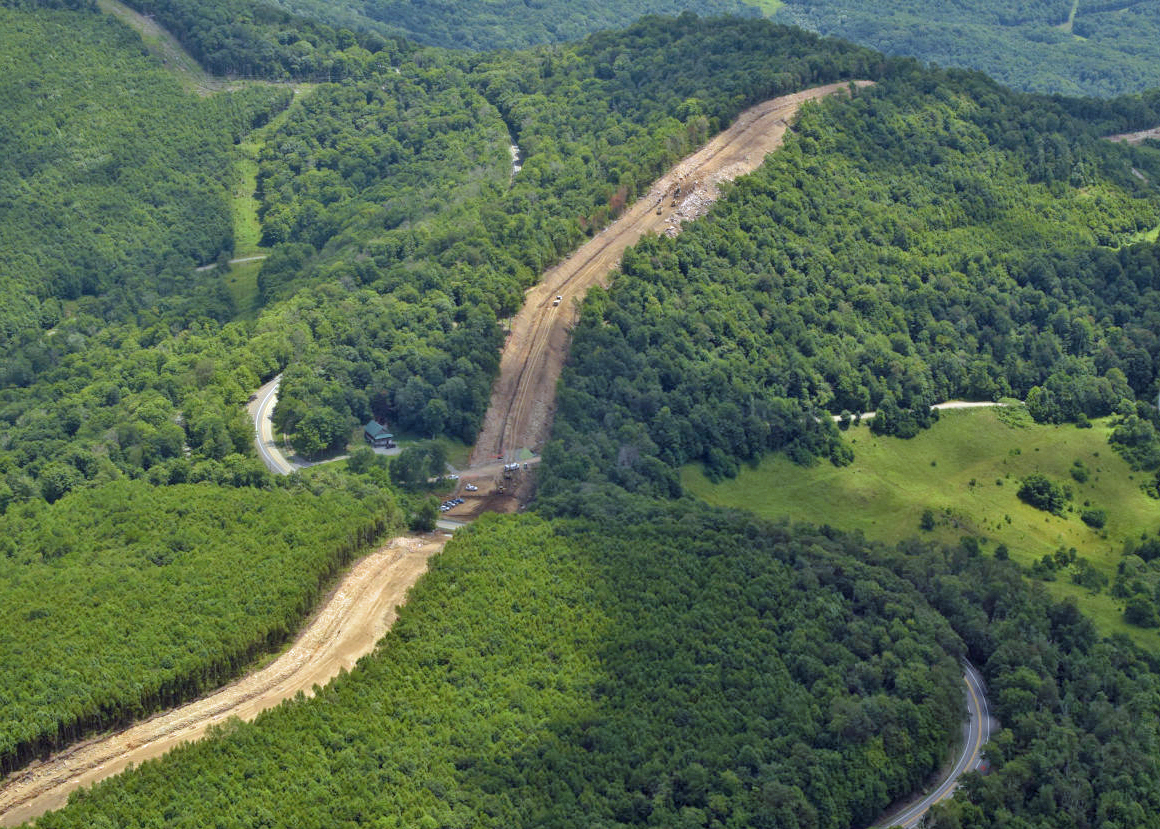The U.S. Supreme Court said Friday that it plans to revisit a lower court's ruling that, among others, forced Virginia's largest electric utility to halt construction on a $7.5 billion natural gas pipeline in the southwest corner of the Chesapeake Bay watershed.
The project's backer, Dominion Energy, petitioned the court to consider the case after the Fourth Circuit Court of Appeals in late 2018 vacated a permit from the U.S. Forest Service. The permit would have allowed pipeline construction to cross the Appalachian Trail and 21 miles of national forest lands. It is one of seven federal permits related to the project vacated by the courts, resulting in a construction stoppage dating to late 2018.
The Fourth Circuit Court ruled last December that the Forest Service did not have the authority to grant the pipeline right of way across the Appalachian Trail, a decision Dominion appealed to the Supreme Court.
"The Supreme Court's acceptance of our petition is a very encouraging sign and provides a clear path forward to resolve this important issue," Dominion spokesman Aaron Ruby said in a statement. "The law and the facts are on our side, and we're supported by a broad coalition of stakeholders."
A Virginia-based group of environmental and historic preservation groups represented by the Charlottesville-based Southern Environmental Law Center opposes the permit. A lawyer from SELC said the groups would continue to defend the lower court's decision.
Greg Buppert, an SELC attorney, said the Supreme Court's decision to take up the case "does not mean that Dominion has won this issue." He continued, "At this point, five years into this project, Dominion still doesn't know the route for its pipeline."
Environmental groups have questioned the government's decision to grant Dominion permission to lay the pipeline across federal lands, streams and habitats known to be frequented by endangered species. Judges have sent several permits back to the federal agencies that issued them, asking them to revisit their criteria and, in some cases, consider an alternative to the proposed route.
The 605-mile-long natural gas pipeline is one of two contentious pipeline projects under way in parts of West Virginia and Virginia. Virginia's Attorney General Mark Herring and the state Department of Environmental Quality sued the other project, the Mountain Valley Pipeline, in late 2018 over more than 300 environmental violations, mostly related to improper erosion control and stormwater management after construction began during a soggy year.
The Supreme Court declined to hear a different pipeline case over the use of a "quick take" type of eminent domain by backers of the Mountain Valley Pipeline. Landowners in the path of that 300-mile-long pipeline through West Virginia and Virginia contended that the project should not have been able to begin construction on their properties without first paying them "just compensation," but the high court will not review their case.
Both projects' paths cut across forested, sometimes steep, terrain and crossed streams in Virginia more than 1,000 times, reports noted.
In July, the same Fourth Circuit Court of Appeals overturned a U.S. Fish and Wildlife Service permit that allowed the Atlantic Coast Pipeline to impact endangered species. At the time, Dominion predicted that the permit's revocation would not impact the project's cost or its timeline for completion by 2021.
Environmental advocates argue that several federal permits were initially issued in haste under political pressure from Dominion Energy, leaving them vulnerable to legal challenges. In a 50-page opinion accompanying the endangered species permit decision, the court seemed to agree.
"In fast-tracking its decisions, the agency appears to have lost sight of its mandate under the [Endangered Species Act]: 'to protect and conserve endangered and threatened species and their habitats,'?" Chief Judge Roger L. Gregory wrote in the opinion.
The lawsuits are not finished, either. This month, SELC attorneys and others will go for the project's metaphorical jugular when they challenge in another federal court the pipeline's baseline permit from the Federal Energy Regulatory Commission. The attorneys will argue that FERC's singular requirement—that the company must have a signed contract with future natural gas recipients—does not go far enough to justify the pipeline's construction.
Dominion officials contend the project is necessary, pointing to growing demand for natural gas-based energy along the proposed pipeline's route. They are confident, too, of their case before the Supreme Court, which hinges on whether the Forest Service has the authority to issue a permit for the pipeline to be built beneath the Appalachian National Scenic Trail with the help of horizontal drilling technology that would keep construction away from the trail itself.
"More than 50 other pipelines cross underneath the Appalachian Trail without disturbing its public use," Dominion's statement said, adding that the pipeline would be installed more than 600 feet below the trail's surface and more than a half-mile from each side of the trail. "The public interest requires a clear process for the issuance and renewal of permits for such pipelines, and other essential infrastructure."
The Supreme Court has not yet scheduled when it will hear the case, but attorneys said the hearing would likely take place in the spring of 2020 with a decision some time that summer.
Whitney Pipkin writes at the intersection of food, agriculture and the environment from her home base in Northern Virginia. Her work for the Bay Journal often focuses on the Potomac and Anacostia rivers, and she is a fellow of the Institute for Journalism & Natural Resources.
Supreme Court Will Hear Atlantic Coast Pipeline Case

A view of the Atlantic Coast Pipeline project across Point Mountain in West Virginia’s Randolph County. (Photo courtesy of the Dominion Pipeline Monitoring Coalition, pipelineupdate.org.)


